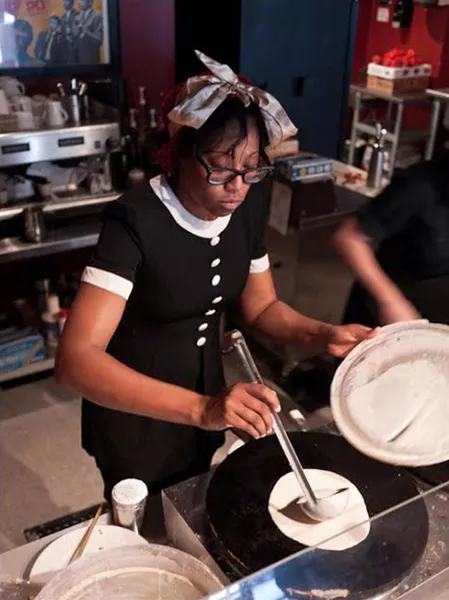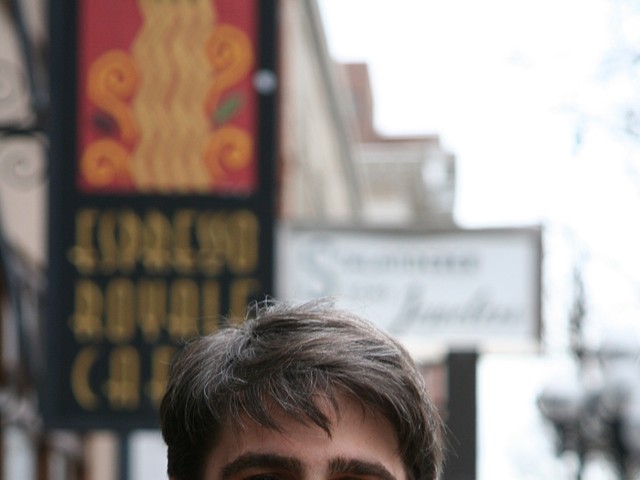Torya Schoeniger is the owner of Good Girls Go to Paris Crepes, a culinary effort inspired by her love of all things French. After finishing her studies at Wayne State University in French and teaching for several years, Schoeniger decided to open her crêpe shop, as well as the stylish, French-influenced restaurant Rodin, which closed at the end of last year. She has now moved her crêperie into Rodin’s former space, where she now serves crêpes with a full bar. She’s a voluble, profane, very funny person with a knack for frank and offbeat opinions.
MT: What advice would you give to people moving into Detroit with a desire to help the city?
Schoeniger: I’ve lived in Detroit all my life, and I’ve never known a Detroit other than RoboCop Detroit. [laughs] This is the best I’ve seen Detroit ever. And I understand the intentions of people moving in with the idea that they’re the new “saviors” or whatever. I’ve befriended a lot of people who’ve just moved to Detroit, and I find everybody’s intentions are very good. I encourage more people to come. Let’s say I didn’t try all these different businesses and didn’t have a crêpe shop and I’ve just been living in the city. I’d see all these new people come in and see that they’re given a voice right away, while other people who’ve lived here have not had a voice. God, that’s a hard question, because you don’t want to …
MT: But it’s true that someone who moves into Corktown and starts a little business there …
Schoeniger: And why Corktown? Because you have a mix of people, but at the same time it’s predominantly white. Why Midtown? You have a big mix of people. Why downtown? You have a lot of things going on. You’re not going to see these people move to …
MT: … Mack and Bewick?
Schoeniger: [laughs] Mack and Bewick! No! I mean, I’m 35 years old now. If you’re 25 years old and have a $50,000-a-year job, where are you going to move? You’re going to move downtown. Where are you going to go? You’re going to try to expand your circle, I think, but you’re going to go with what you know, to places where people look like you.
MT: But I think what makes your perspective interesting is that you seem to straddle those two worlds so well.
Schoeniger: I’m a black, lifelong Detroiter. But I am able to move within the different realms of Detroit easily, and I do it all the time. And it’s not even code-switching, because I talk the way I talk, am the way I am. I’ve been the same person since high school! I’m fortunate enough to have been exposed to lots of different experiences and people. And I welcome people with open arms, but at the same time … I do get the little hairs on the back of my neck that stand up when people just all of a fucking sudden come in and they’re just like the new shiny penny. [laughs] Certain people come here because of a job, and those jobs give them a platform and …
MT: … and they’re instantly taken much more seriously than somebody who’s lived at Seven Mile and Conant.
Schoeniger: Because money talks. Always. And, at the end of the day, people in power can relate to people who have similar backgrounds, rather than reaching out to somebody who’s different.
MT: It’s self-selecting thing?
Schoeniger: I really don’t think it’s done on purpose. I don’t think it’s intentional. I think that people gravitate toward people they’re comfortable with. You can challenge it all you want, but people are going to gravitate to somebody you’re comfortable with.
MT: But that also plays out in what businesses you patronize. What about supporting longtime businesses?
Schoeniger: The funny thing about that is, Detroit is a big city, but it’s like a small town, really. Everyone kind of knows each other. When you open a business it makes news. When you close a business, it makes news. It seems when you do anything, it becomes local, if not national news. I moved my crêpe shop and the Free Press and the News wrote about it. If this were Chicago, nobody would give a shit. Nobody would care. Anyway, I can honestly say I go places in the neighborhoods. I do some of my shopping at Whole Foods, and if I go to my old neighborhood, I go to Foodland. Or I go to the big beauty supply shop on Greenfield. That’s where it gets difficult. You have these people who’ve been here all their lives and how do you meet them? Are you going to go get a haircut at Classic Cuts on Warren? If you did that, would that make you a “Detroiter”? You have to prove something?
MT: Well, what should newcomers do?
Schoeniger: Right now is the perfect time to create, really create. There’s a huge housing surplus. You can get a house for $500, for $2,000 in Poletown, just outside Midtown. If I could encourage any young people moving to Detroit, white or otherwise, to do something, it would be to buy a house where you wouldn’t normally buy a house. There is so much room to do something creative. Like Patti Smith said, New York is taken. My dream house would be to take one of these old houses and make it your Pinterest mansion. There are pockets of that, like when you go on Farnsworth, full of people that farm and do really creative things, or North Corktown, which they weren’t talking about that much five years ago.
MT: I get that Detroit’s a good buy for newcomers who don’t have a lot of capital, relatively speaking. But this whole idea of coming in and planting your flag, what’s the best way to do that in a way that’s productive for everybody?
Schoeniger: I’d say do it and don’t expect to be patted on the back. Do it and don’t expect to be written about. Don’t say, “I’m going to go in and plant my flag and do all these amazing things and get all this notoriety.” Just do it. And those things could come, because, again, it’s a small town. But do it because you have a passion. Not to knock someone who wants to buy a nice loft or live in Corktown, Midtown or some green “safe zone,” but just outside the safe zone are some great places to plant that flag, like the North End. I’ve said before, give it 10 more years and North End will be like Woodbridge, you know?
MT: The housing stock’s great, the people who live there have lived there a long time …
Schoeniger: … Yeah, I just see so much potential. I know this sounds crazy, but a lot of the things I said sounded crazy five years ago, and now they’re coming to fruition. And it’s happening so fast. The rulebook for Detroit changes every month. The players change every single month. So much has changed in the six years I’ve been in this scene of young entrepreneurs. It’s kind of startling. I’m asked about entrepreneurship, and I don’t really have the answers. If people come in with good intentions and follow their passion, whether that’s art projects or opening up a business, and just do it for the love of whatever they’re doing, that’s great. I mean, you couldn’t do this anywhere else.
MT: One thing that comes up in these discussions is that even if you have good intentions, unless you understand the very real struggles that people face here, you are going to have a mentality that doesn’t lend itself to an integrated, healthy neighborhood.
Schoeniger: I guess people can’t help if they grew up in the suburbs and are white, they might not fit that idea of being “one of us.” Are you going to turn people away? It’s going to happen. There’s nothing you can do to stop the train of Detroit turning into a regular city. Are you going to say, “I want the old way back”? What do you do?
MT: Well, put it this way: From the time you grew up in Detroit until, say, five years ago, you always knew what the identity of Detroit was.
Schoeniger: The identity of Detroit was shit. Now it has a cachet about it. Now people outside Detroit want to make Detroit T-shirts about it and sell it back to us. [laughs] People want to ride the Detroit train. If I hear another word about us being “resilient.” “Oh, I was there when Detroit turned the corner!” So what? That’s very strange to me. Detroit was shat upon my entire life. Now you say Detroit and people are like, “Oh, I heard you can buy a house for next to nothing!”
MT: But when people say Detroit is a blank slate, the frontier, the Wild West, and you can colonize and conquer the area setting up your homestead, don’t these kinds of metaphors rankle longtime Detroiters?
Schoeniger: Yes, but what you just said, I wish you could say it again. It’s so true.
MT: But it’s not a blank slate, is it? There’s 700,000 people already there!
Schoeniger: It’s not a blank slate, but when you have been beaten down your entire life, people are tired. I’ll tell you this, one place you don’t feel that divide is at Whole Foods, which I absolutely love. It’s the cheapest Whole Foods you’d ever want to go to. You see neighborhood people and newcomers and new money in that store. I find that very interesting.
MT: OK, enough of what you think. What would the people who’ve been your longtime neighbors say about what’s going on?
Schoeniger: I grew up in Rosedale Park, Grandmont One. They welcome white people with open arms. [laughs] Jesus Christ! In my neighborhood, I don’t think there’s this feeling of “We don’t want you here.” I think the feeling is, “We want whoever can pay for this house, whoever wants to come.” It’s different from Corktown, downtown or Midtown. In the neighborhoods, they want whoever wants to come. I can’t speak for everybody in those neighborhoods, but, personally, I found a perfect little homestead in Brightmoor. I know that sounds crazy as hell. …






